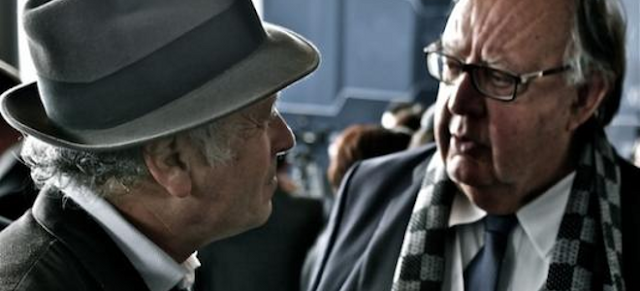Δεν είναι και πολύ δύσκολο να ξεχωρίσεις τον Χοντρομπάσταρδο*¹ ανάμεσα σε ένα πλήθος από πανέμορφες Ρωσίδες, βιομήχανους και μιντιάρχες στο Eurasia Media Forum στο Καζακστάν (κάτι σαν καρναβάλι για τους ανατολίτες ολιγάρχες), γράφει ο δημοσιογράφος Γκρεγκ Πάλαστ για τον πρώην υπουργό σε ένα απίστευτα σκληρό άρθρο με τίτλο «Έτσι εκνεύρισα τον Πάγκαλο».
Γράφει ο Πάλαστ:
«Αν μη τι άλλο θέλαμε και οι δυο θέλαμε απεγνωσμένα καφέ και ήμασταν στην ίδια ουρά. Σε κάθε περίπτωση αποφεύγω να αναφέρομαι στο βάρος ενός ανθρώπου ή στην ηλικία του δεδομένων και των δικών μου μειονεκτημάτων. Αλλά ο συγκεκριμένος Χοντρομπάσταρδος το αποζητά. Είχα προσπαθήσει να βγάλω την εικόνα της κοιλιάς του από το μυαλό μου αλλά ένα απόκομμα των New York Times βάραινε την τσέπη μου καθώς αναφερόταν στα υποσιτισμένα παιδιά των δημοτικών σχολείων.
Ο Χοντρομπάσταρδος, ή αλλιώς Θεόδωρος Πάγκαλος, κορυφαίο στέλεχος του ΠΑΣΟΚ, θεωρεί ότι τα μικρά ελληνόπουλα πρέπει να σταματήσουν να πεινάνε. Όπως βλέπετε στην φωτογραφία κάτω ούτε εκείνος σφαδάζει από τον πόνο της πείνας. Ίσως να δείχνει ότι θα διπλώσει από τον πόνο από την δουλειά ή καλύτερα ότι δεν μπορεί να διπλώσει καθόλου.
Ο Πάγκαλος κατηγορεί τους εργαζόμενους ότι ευθύνονται για την πείνα και την κατάσταση στην οποία βρίσκεται η ελληνική οικονομία. Αλλά δεν είναι δικό του το λάθος και παρόλο που ήταν αντιπρόεδρος της κυβέρνησης που αντιμετώπισε τον πυρήνα της κρίσης γιατί να θεωρηθεί υπεύθυνος για οτιδήποτε;
Ο Υπουργός Πάγκαλος είναι πολύ αγαπητός ανάμεσα στους Ευρωπαίους τραπεζίτες, στους σπεκουλαδόρους, στην Άγκελα Μέρκελ γιατί στην ουσία είναι ο σκύλος που γαβγίζει για το μαντρί τους: Φωνάζει ότι η χώρα του κατέρρευσε απότομα γιατί το λάδι έρρεε άφθονο, οι τεμπελχανάδες οι Έλληνες δεν μπορούσαν να δουλέψουν για περισσότερες από τρεις ώρες την εβδομάδα και έπαιρναν σύνταξη όντας ακόμη έφηβοι ώστε να μπεκροπίνουν τοπικό ουζάκι.
Ο ίδιος επιμένει να καλεί τους Έλληνες να δεχθούν την οικονομική κατοχή, την ώρα που ένας στους τέσσερις δεν έχουν δουλειά. Για το αρχείο, οι Έλληνες δουλεύουν ετησίως 619 ώρες περισσότερο από τους Γερμανούς και πολλές περισσότερες από τους Βρετανούς ή τους Αμερικάνους.
Καθώς ήμασταν στην ουρά για τον καφέ λοιπόν, ο Χοντρομπάσταρδος μου λέει ότι όποιος αντιδρά στην λιτότητα είναι «φασίστας ή κομμουνιστής ή συνομωσιολόγος». Δεν μου εξήγησε βέβαια σε ποια από τις προαναφερθείσες κατηγορίες εντάσσεται ένας 11χρονος που λιποθυμά από την πείνα.
Για τον Πάγκαλο, την Μέρκελ, τα ανθρωποφάγα μίντια και τους σπεκουλαδόρους η Ελλάδα πήγε κατά διαόλου γιατί οι Έλληνες δεν μπορούσαν να καθίσουν σε μια καρέκλα και ήθελαν διακοπές. Αλλά υπάρχει και μια άλλη εξήγηση: η Ελλάδα είναι ένας τεράστιος τόπος εγκλήματος με τους εργαζόμενους να μην είναι οι θύτες αλλά τα θύματα – απατημένοι με τις κρατικές βιομηχανίες τους λεηλατημένες και τις καταθέσεις τους αποστειρωμένες από τα οικονομικά παιχνίδια.
Αλλά όταν πέρασαν από την δραχμή – που τόσο αγαπούσαν οι τουρίστες – στο ευρώ πείραξαν τα νούμερα του ελλείμματος. Γιατί το έκαναν αυτό; Γιατί το ευρώ είναι κάτι περισσότερο από νόμισμα. Είναι ένα πλέγμα νόμων και κανονισμών που απαγορεύει να υπάρχει χώρα με έλλειμμα πάνω από 3%.
Αυτό όμως είναι αδύνατο να γίνει σε μια περίοδο ύφεσης καθώς απαιτεί περικοπές δαπανών όταν αυτές είναι πιο απαραίτητες από ποτέ. Φοβούμενη λοιπόν η Ελλάδα ότι θα μείνει έξω από τον χορό του ευρώ στράφηκε στην Goldman Sachs. Εκείνη μαγείρεψε τα νούμερα για το διόλου ευκαταφρόνητο ποσό των 400 εκατομμυρίων δολαρίων. Όταν όμως το κόλπο αποκαλύφθηκε το 2009 οι Έλληνες κλήθηκαν να πληρώσουν τα σπασμένα στους ομολογιούχους. Το ποσό ανερχόταν σε 14.000 δολάρια ανά οικογένεια.
Όταν ήμουν ερευνητής του αμερικανικού Υπουργείου Δικαιοσύνης – την περίοδο που υπήρχε ακόμη δικαιοσύνη στις ΗΠΑ – θα είχαμε ονομάσει «απάτη των αγορών» το κόλπο με τα παράγωγα, θα είχαμε συλλάβει τους υπαίτιους ή στην καλύτερη των περιπτώσεων θα τους είχαμε αναγκάσει να επιστρέψουν την «μίζα».
Πρέπει λοιπόν να πληρώσει η Goldman Sachs; Όχι κατά τον Πάγκαλο που θεωρεί ότι το θύμα είναι εξίσου υπεύθυνο με τον θύτη κάτι που αποδεικνύεται από το «μαζί τα φάγαμε». Αλλά οι φωτογραφίες δείχνουν ότι μόνο ο Πάγκαλος, και όχι ο 11χρονος μαθητής του άρθρου των NYT, τα έφαγε όλα.
Θα πήγαινα για μεσημεριανό μαζί με τον Πάγκαλο για να καταλάβω ακριβώς τις απόψεις του αλλά έφυγε με έναν ρόγχο παχύδερμου όταν τον ρώτησα για τον πρώην πρωθυπουργό της Ισλανδίας που κατέληξε στην φυλακή επειδή υπέκρυψε παιχνίδια με την οικονομία της χώρας. Ίσως δεν ήθελε να φάμε παρέα γιατί τον ρώτησα εάν πιστεύει ότι πρέπει και αυτός να πάει στην φυλακή
*¹ Όνομα αντιήρωα στις ταινίες με τον Austin Powers
*Ο Πάλαστ είναι πολυδιαβασμένος συγγραφέας και ερευνητής δημοσιογράφος για το BBC Newsnight και τον Guardian. Πηγή: Vice.com
Στη φωτογραφία ο Πάλαστ με τον Πάγκαλο, όπως την ανέβασε ο ίδιος ο δημοσιογράφος
Το άρθρο του Πάλαστ στα αγγλικά:
Monday, May 20, 2013 By Greg Palast for Vice Magazine
My Big Fat Greek Minister
It wasn’t too difficult picking out the Fat Bastard in the crowd of Russian models, craven moochers and media mavens. Besides, Fat Bastard and I were both desperate for coffee and heading for the same empty urn.
(We’d both signed on for Kazakhstan’s annual Eurasia Media Forum, a kind of Burning Man festival for Eastern oilgarchs and their media camp followers.)
Now, it is my policy never to mention an interlocutor’s weight, nor question the legitimacy of their birth, given my own vulnerabilities. (A would-be groupie told me, “You could do a few sit-ups, you know.” Yes, I know.)
But this particular Fat Bastard is asking for it. I had tried to put the belly of this beast out of my thoughts, but I still had a New York Times story folded in my pocket that begins:
ATHENS – As an elementary school principal, Leonidas Nikas is used to seeing children play, laugh and dream about the future. But recently he has seen something altogether different, something he thought was impossible in Greece: children picking through school trash cans for food; needy youngsters asking playmates for leftovers; and an 11-year-old boy, Pantelis Petrakis, bent over with hunger pains.
Fat Bastard – or Theodoros Pangalos, thinks the little Greek kiddies should stop belly-aching. Pangalos, as you can see from the photo below, is not bent over with hunger pains. In fact, he looks more likely to be bent over with labour pains, but in truth he probably just can’t bend over at all.
Pangalos is best known for blaming the working people of Greece for the horror and the hunger among the ruins of what was once Greece’s economy. However, it is, of course, not his fault; until last year, and through the core of the crisis, he was just Greece’s Deputy Prime Minister – why should he be held accountable for anything?
Minister Pangalos is much loved by Europe’s banking chieftains, by vulture speculators and by Prussian President Angela Merkel because they’ve got themselves a gigantic Greek who will mouth their mantra: that his nation’s sudden collapse can be blamed squarely on olive-pit-spitting, lazy-ass Greeks who won’t work more than three hours a week, then retire while they’re still teenagers to swill state-subsidised ouzo.
Pangalos leads the Fifth Column of Greeks calling to accept Germany’s terms of economic surrender: austerity, meaning cuts in food allowances, in pensions, in jobs. As of this week, more than one in four Greeks (27 percent) are out of work.
While we hunted for caffeine, Fat Bastard told me that anyone who complains about the austerity diktat, “Is a fascist or a communist or a conspiracy theorist.” He didn’t tell me which of these three categories the 11-year-old kids complaining of hunger pains fell into.
Just for the record, those Greeks who can get a job, work 619 more hours per year (see table) than the average German (and way, way more than Britons or Americans as well).
But in the world according to Pangalos, Merkel and poobahs of the media, Greece went to hell in a handbag because the entire nation suddenly turned into work-shirking grifters.
But there’s another explanation for wrack and ruin: Greece is a crime scene. And its working people are not the perpetrators of the crime, they are the victims – scammed, defrauded, their national industries looted and their treasury drained by financial flim-flam.
Ιn 2001, Greece dropped the drachma for the euro. The drachma was good enough for Aristotle and very good for tourism, Greece’s main industry. But when sun-and-fun was re-priced in euros, tourists swam across the Adriatic for kofte meatballs priced in dirt-cheap Turkish lira. Pre-euro tourist visits to Greece outnumbered those to Turkey by millions; but by last year, it was the just the opposite, with two-thirds of tourists tanning in Turkey.
With its Treasury bleeding hard currency, the government of Minister Pangalos’ PASOK joined together with the opposition in a complex international currency kiting operation to conceal the losses from the public and, most importantly, from the European Central Bank.
Why the cover-up of the deficit? The answer is that the euro is more than a currency: it is a straitjacket, a set of constricting rules that, for example, prohibit any euro nation from running a deficit of more than 3 percent of GDP.
That’s impossible in a recession – not to mention plain insane – as it requires cutting public spending when spending is needed most. The USA, China, Brazil, India – the nations that pulled the world from depression’s brink – all ran deficits way over the nutty 3 percent cap. I asked finance wiz Nomi Prins to calculate America’s debt-to-GDP ratio using euro rules, and she estimates that Obama’s deficits are now way down from recession’s peak – to 10.2 percent of GDP.
Greece, fearing expulsion from the euro loony bin, turned to Goldman Sachs. For a mere $400 million in fees, plus golden sacks of ill-gotten trading gain, the investment bank was willing to cook the nation’s books via a complex set of derivatives transactions. [For the particulars of the derivatives con, see How Goldman Sacked Greece.]
Since the con was busted open in 2009, the Greek public has had to pay cheated bondholders a premium to insure against default of the nation’s debts. The credit default insurance costs an average of $14,000 (£9,218) per family per year.
When I was a racketeering investigator working with the US Justice Department, in the days when we pretended America still had justice, we would have called the derivatives trick a “fraud on the market”. We’d handcuff the perpetrators, lock ’em up, or, at the least, make them cough up their purloined profits.
So, should Goldman pay up? Not according to Pangalos, because – in the worldview of our rulers – the victims of the scam are as guilty as the victimisers. Pangalos even put it into a famous (or infamous) motto: mazi-ta-fagame. That’s Greek for “We all ate it together”.
But the visible evidence suggests Pangalos, not Pantelis – the kid doubled over with stomach pain – ate all the pies.
The mass privatisation of public property at wiener schnitzel prices has German speculators dipping in their spoons as well, though the Federation of German industry is complaining about Greece’s own “princes” gobbling up the assets.
I was going to invite Minister Pangalos to lunch to test his theories, but he left in a pachydermic huff when I asked him about Geir Haarde. Haarde, the former Prime Minister of Iceland, was found guilty of concealing his knowledge of the trickery used by Iceland’s banks before they melted that nation’s finances.
I asked Fat Bastard, “Do you think you should be in prison for” similar conduct in the Greek government?
Maybe that’s why Minister Pangalos didn’t want to go to lunch with me.



